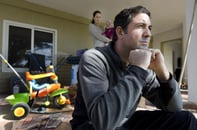Published on
Meeting the Needs of Adult Learners

The following interview is with Eric Riedel, the Chief Academic Officer at Walden University. Walden, a private for-profit institution headquartered in Minneapolis, MN offers a range of degrees primarily online and serves a large population of adult students. In this interview, Riedel discusses a few factors that Walden tries to emphasize when reaching out to adult learners, as well as some strategies on communicating those elements, and shares his thoughts on the future of adult higher education.
1. What three elements of Walden University seem to be most important to prospective adult students?
I would say that one is access, and access meant very broadly; both in terms of online access—the ability to access your classroom from your desktop—but also in terms of hours, adult learners are very often full-time employed and work on their classes in the evenings. They want tech support, for example, that’s available 24 hours… but also access in terms of where they are as a student. Many students are coming back to higher education after a number of years so institutions that serve adult learners need to recognize that both in terms of how to train faculty and opportunities, for example, to get them up to speed on academic writing or their math skills. …
Another one is recognizing that adult learners need relevance in terms of their professional work. They need it to be concrete and applicable. For Walden, our mission is to create practitioners who are able to apply what they have learned for positive social change in their professions.
A third thing is that adult learners—well, all students typically—want to know that their degree is going to be respected by colleagues and employers. … It’s important that the institution is accredited but they also look for those other aspects of quality and reputation. For Walden, we have a number of specialized accreditations in education, nursing and business and counseling, in addition to our institutional accreditation.
2. How does the university communicate these advantages to prospective students?
I think one important aspect for adult learners in general is that students and alumni are some of the best communicators about the advantages of an institution. Colleagues in the workplace may talk about the program they’re currently in or that they just completed, and that’s of interest to other nursing students, or other teachers who want to obtain a Master’s. Sometimes our best communication is word of mouth.
Walden also has a nationally recognized data website demonstrating assessment, transparency and accountability. It’s recognized by the National Institute for Learning Outcomes and Assessment, it talks about our student outcomes on its public website. We also encourage and fund our faculty and students to present on their research and practice at different professional conferences.
And then, at the individual student level, it’s important that our students have good advising from the beginning—when they’re considering the program to make sure they’re getting the right program—and ongoing academic advising throughout their program so that they clearly understand not only the requirements of their programs but that there’s different resources available within an institution to help them. …
3. How have these “most important elements” changed over time since Walden was established?
Walden was established approximately 42 years ago by New York teachers Bernie and Rita Turner who worked with a professor at UC Berkeley, Hodgkinson, to create an institution to assist graduate students who were essentially ABD (all-but-dissertation), who were working on their dissertations but typically had to drop out for family or work reasons. They wanted an opportunity for these students to finish. So they worked at creating a distance education model that had a summer residency that paired faculty with students to allow them to finish.
Our mission of creating positive social change… has always been there for Walden, and the distance education element has always been there. But Walden has changed over the years in that it now offers Master’s and Undergraduate level [programming] in the same disciplines. It emphasizes lifelong learning, so we have a number of students that have their Bachelor’s and want to attain their Master’s, or who have their Master’s and want to attain their doctorate.
In addition, there’s a growing presence of international students and students with international experience at Walden. As a result, we’ve changed some of the training for our faculty and staff, so for example we have staff in the Writing Center with … English language learner backgrounds to help our international students.
Finally, I think that Walden has done a better job about communicating publically about its reputation, both in terms of some of its programmatic accreditations and the publications of presentations its faculty do and even its website.
4. What do you think adult learners will want from their educational experiences five years down the line? Will the adult higher education scene be significantly different than it is today?
I think some of it will be the same and some of it will be different. I see some of the same trends continuing and growing stronger over time.
I think the use of technology and putting coursework online was one of the biggest changes of the last couple of decades. I think we will now see more innovations in online classrooms. For example, Walden uses a virtual field experience in addition to its in-person field experiences to make sure that our education students get an opportunity to see different types of classrooms and different student bodies in addition to their regular field experience. That’s an innovation that draws on technology advances.
I think there will be more in terms of access; I think online has become basically mainstream that it’s not just a few institutions that have programs or parts of the programs online. I think that’s basically all of higher education institutions. I think adult learners will have more to choose from.
Finally, I think there will be a greater emphasis not just for adult learners but for higher education graduates in general in applying and demonstrating their knowledge in the workplace and elsewhere. I do see a trend that this application is not just for immediate circumstances, but also what can the student—especially graduate students—do to advance their organizational whole. This is very much in line with Walden’s mission of increasing positive social change as a result of their degree.
5. Is there anything you would like to add about what adult students are looking for from their higher education experiences today?
I think they are more discerning about higher education. It’s not just about getting the degree, getting a credential—although that’s always and in some ways increasingly important. It really is about, “What can you do as a result of that degree and how does it directly apply to their work?”
I think adult learners have always, and perhaps increasingly so, are really interested in that aspect of their program. That they can take what they’ve learned in the classroom and practice it the next day at their work or in the community. It’s a really exciting part of Walden’s mission.
Author Perspective: Administrator



